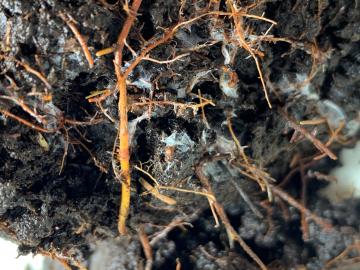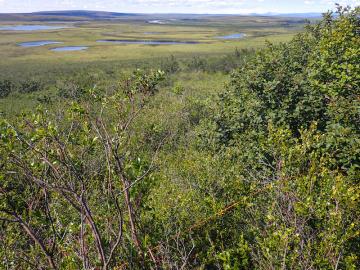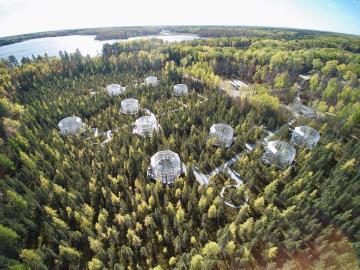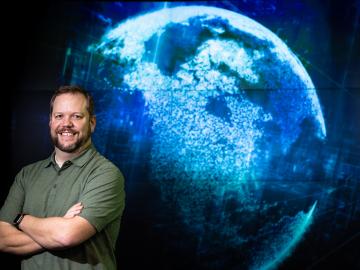
Filter News
Area of Research
- (-) Biology and Environment (56)
- (-) Supercomputing (72)
- Advanced Manufacturing (22)
- Biology and Soft Matter (1)
- Building Technologies (1)
- Computational Engineering (2)
- Computer Science (5)
- Electricity and Smart Grid (1)
- Energy Science (112)
- Functional Materials for Energy (1)
- Fusion and Fission (6)
- Fusion Energy (2)
- Isotope Development and Production (1)
- Isotopes (27)
- Materials (44)
- Materials for Computing (6)
- Mathematics (1)
- National Security (36)
- Neutron Science (12)
- Nuclear Science and Technology (13)
- Quantum information Science (2)
- Sensors and Controls (1)
News Topics
- (-) 3-D Printing/Advanced Manufacturing (13)
- (-) Big Data (29)
- (-) Cybersecurity (9)
- (-) Frontier (32)
- (-) Isotopes (3)
- (-) Security (6)
- (-) Space Exploration (3)
- Advanced Reactors (2)
- Artificial Intelligence (41)
- Bioenergy (50)
- Biology (76)
- Biomedical (28)
- Biotechnology (15)
- Buildings (6)
- Chemical Sciences (15)
- Clean Water (11)
- Composites (5)
- Computer Science (105)
- Coronavirus (22)
- Critical Materials (4)
- Energy Storage (11)
- Environment (105)
- Exascale Computing (28)
- Fusion (2)
- Grid (7)
- High-Performance Computing (56)
- Hydropower (8)
- Machine Learning (20)
- Materials (24)
- Materials Science (22)
- Mathematics (5)
- Mercury (7)
- Microscopy (16)
- Molten Salt (1)
- Nanotechnology (16)
- National Security (9)
- Neutron Science (16)
- Nuclear Energy (5)
- Partnerships (6)
- Physics (9)
- Polymers (4)
- Quantum Computing (20)
- Quantum Science (25)
- Simulation (26)
- Software (1)
- Summit (47)
- Transportation (8)
Media Contacts

The U.S. Department of Energy’s Office of Science announced allocations of supercomputer access to 51 high-impact computational science projects for 2022 through its Innovative and Novel Computational Impact on Theory and Experiment, or INCITE, program.

An international problem like climate change needs solutions that cross boundaries, both on maps and among disciplines. Oak Ridge National Laboratory computational scientist Deeksha Rastogi embodies that approach.

New data hosted by Oak Ridge National Laboratory is helping scientists around the world understand the secret lives of plant roots as well as their impact on the global carbon cycle and climate change.

Scientists at Oak Ridge National Laboratory added new plant data to a computer model that simulates Arctic ecosystems, enabling it to better predict how vegetation in rapidly warming northern environments may respond to climate change.

Scientists studying a unique whole-ecosystem warming experiment in the Minnesota peatlands found that microorganisms are increasing methane production faster than carbon dioxide production.

The U.S. Department of Energy’s Innovative and Novel Computational Impact on Theory and Experiment, or INCITE, program is seeking proposals for high-impact, computationally intensive research campaigns in a broad array of science, engineering and computer science domains.

Twenty-seven ORNL researchers Zoomed into 11 middle schools across Tennessee during the annual Engineers Week in February. East Tennessee schools throughout Oak Ridge and Roane, Sevier, Blount and Loudon counties participated, with three West Tennessee schools joining in.

Cory Stuart of ORNL applies his expertise as a systems engineer to ensure the secure and timely transfer of millions of measurements of Earth’s atmosphere, fueling science around the world.
A study by Oak Ridge National Laboratory, the University of Copenhagen, the National Park Service and the U.S. Geological Survey showed that hotter summers and permafrost loss are causing colder water to flow into Arctic streams, which could impact sensitive fish and other wildlife.

A new tool from Oak Ridge National Laboratory can help planners, emergency responders and scientists visualize how flood waters will spread for any scenario and terrain.


